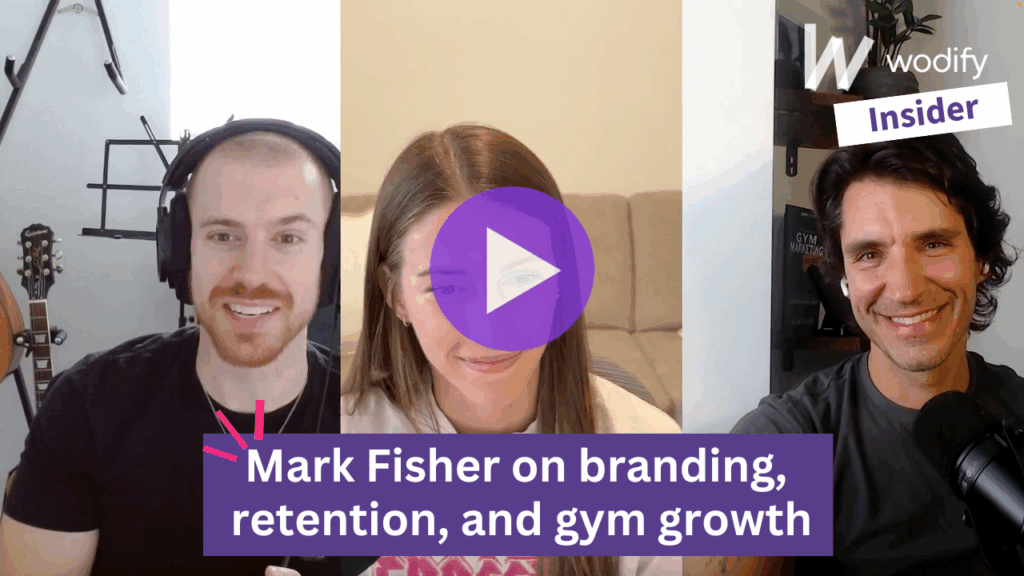Norem ipsum dolor sit amet, consectetur adipiscing elit. Etiam eu turpis molestie, dictum est a, mattis tellus. Sed dignissim, metus nec accumsan.
How do you turn a quirky, Broadway-inspired gym into one of the most successful fitness brands in New York City — and then turn around to help other gym owners do the same?
In a recent episode of The Wodify Insider Podcast, host Cory Matchulat sat down with Mark Fisher, founder of Mark Fisher Fitness and Business for Unicorns, to unpack his unique journey from theater kid to fitness mogul — and the lessons every gym owner can learn from his story.

The Unconventional Path to Gym Ownership
Mark Fisher’s path to fitness entrepreneurship is anything but typical. Before running one of Manhattan’s most recognizable gyms, Fisher was an actor — “a struggling boob,” in his own words — seeking stability in a chaotic industry. Fitness became his anchor and what began as a passion project quickly exploded into Mark Fisher Fitness (MFF), a wildly creative, community-centered gym for Broadway performers.
The result? A business that balanced serious results with serious fun with a brand identity so strong that clients proudly called themselves “ninjas” and “unicorns.”
“People don’t forget the unicorn gym,” Fisher said. “We made fitness ridiculous and joyful, but also extremely effective.”
The Power of Data—and the Human Touch
Early in his career, Fisher was all heart and no strategy (or spreadsheets!). But as MFF grew, he realized what many gym owners eventually learn: passion alone can’t scale a business.
He became obsessed with understanding his metrics — from payroll ratios to lead conversion rates — and now he’s obsessed with helping other gym owners develop that same data fluency through his company Business for Unicorns.
“Numbers don’t replace people,” he explained. “They help you serve them better. You can’t help clients if your business isn’t healthy.”
Still, Fisher warns against over-engineering. Gym owners shouldn’t lose sight of what makes their business thrive: the relationships between coaches and clients.
Marketing Myths and the Instagram Trap
When asked which marketing channels gym owners misuse the most, Fisher didn’t hesitate: Instagram.
While Instagram is an important “proof point” for prospects, Fisher argues that many gyms waste time chasing trends instead of focusing on real lead generation.
“Your Instagram should look alive, but most gyms won’t get leads from reels and trending audio,” he said. “Use it to show that your lights are on, not as your only marketing plan.”
Instead, he recommends focusing on three proven channels:
- A clear, conversion-focused website: optimized for “who you help and how you help them.”
- A strong Google Business profile: updated weekly with posts and fresh reviews.
- Direct outreach and referral offers: leveraging existing members and local partnerships.
According to Fisher, these three channels consistently outperform social media in both ROI and reliability.
Retention Starts With Experience — Not Discounts
Fisher’s biggest insight for gym owners is simple: your retention strategy starts inside the session.
“If you want people to stay, you have to be amazing at the thing,” he said. “Your sessions need to be fun, effective, and personal.”
At MFF, every member was greeted by name, every class had clear coaching standards, and every trainer was trained to give multiple individualized touchpoints per session. The results? A cult-like community with remarkably low churn.
He also emphasizes professional systems — not just enthusiasm:
- Standard operating procedures (SOPs) for coaching, onboarding and customer service.
- Regular quality audits to ensure consistent client experiences.
- Clear expectations for staff performance and growth.
Leading With Culture—and Letting Go
When it comes to managing teams, Fisher takes a human-first approach. He believes retention efforts apply to staff as much as clients.
Rather than restrict employees with rigid non-competes, he focused on relationships and transparency:
“I want people to grow here, but I’m okay if they grow beyond here,” Fisher said. “I want to be proud of them when they move on.”
That mindset, combined with open communication and structured onboarding, built one of the most loyal and stable coaching teams in boutique fitness.
The Brand That Broke the Mold
From glitter-filled postcards to cheeky bathroom signs, MFF’s brand was unforgettable. But beneath the silliness was a foundation of precision—every color, phrase and font was intentionally designed to reinforce the gym’s values of inclusivity, joy and excellence.
Fisher believes every gym can find its own version of that authenticity:
“You don’t have to be the unicorn gym,” he said. “You just have to know who you are and be that consistently.”
Key Takeaways for Gym Owners
- Master your metrics. Know your churn rate, average revenue per member, and acquisition costs — they’re the heartbeat of your business.
- Don’t chase trends. Focus on channels that bring real leads: your website, Google profile and local referrals.
- Invest in your product. Great marketing can’t fix bad sessions. Coaching quality drives retention.
- Systemize success. Clear SOPs, audits and onboarding make excellence repeatable.
- Lead with empathy. Your culture defines your brand more than your logo ever will.
Learn More: Business for Unicorns + Wodify
Mark Fisher continues to coach gym owners through Business for Unicorns, offering courses, mentorship and live events.
For more details, visit businessforunicorns.com.
About Wodify
Wodify is an all-in-one gym management software platform built to help fitness businesses grow. From lead automation and member engagement to performance tracking and revenue insights, Wodify empowers owners to run smarter, more successful gyms. Book a demo with a member of our team to learn more.




